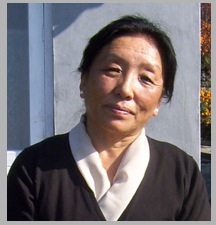 The Winter 2013 issue of Tricycle Magazine features an interview with Tibetan Nuns Project founder and co-director, Rinchen Khando Choegyal.
The Winter 2013 issue of Tricycle Magazine features an interview with Tibetan Nuns Project founder and co-director, Rinchen Khando Choegyal.
The article, entitled “Standing as Equals” is written by Barbara Gates.
In the sitting room at Kashmir Cottage, situated between the main town of Dharamsala and the area that is the seat of the exiled Tibetan government in India, I shared a pot of ginger tea with Rinchen Khando Choegyal, founder and director of the Tibetan Nuns Project and wife of the younger brother of His Holiness the Dalai Lama. I enjoyed the resonant cadence of her voice as she described the history of the project and the work of women, lay and monastic, in keeping alive the teachings of the Buddha and the richness of Tibetan culture amid the hardships of exile.
Rinchen Khando was born in eastern Tibet; her parents, from a farming and business background, were, as she put it, “well-to-do, but very devout and simple people.” At the end of 1958, her family came to India for a pilgrimage to Bodh Gaya and Varanasi. The plan was to leave the young Rinchen in India to attend a boarding school run by Catholic nuns. But before her parents returned home, the Chinese invaded Tibet. Since then, her family has lived in India. “Because we were already in India in 1959,” said Rinchen Khando, “we were saved.” They’d left behind almost everything they had.
 In 1987, together with other activist women in the exile community, Rinchen Khando established the Tibetan Nuns Project (TNP). The project is committed to education, empowerment and improved status for ordained Tibetan women. It now supports over 700 Tibetan nuns living in North India. Continue reading
In 1987, together with other activist women in the exile community, Rinchen Khando established the Tibetan Nuns Project (TNP). The project is committed to education, empowerment and improved status for ordained Tibetan women. It now supports over 700 Tibetan nuns living in North India. Continue reading
